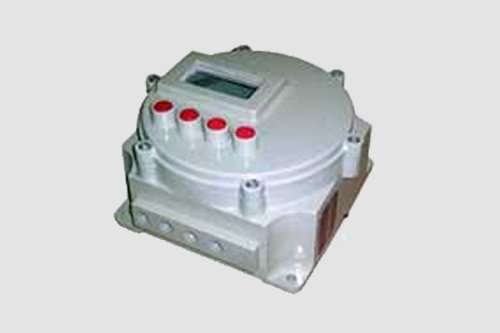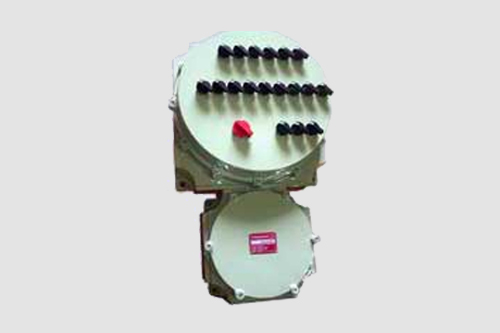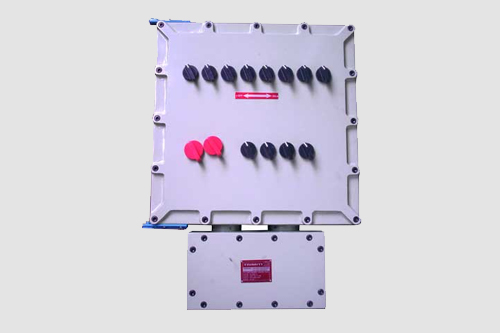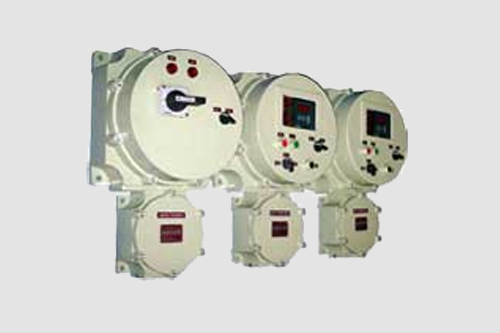
Weighing Machine Control Panels

MCB / MCCB Panels

MCB-MCCB-Panels

MCB / MCCB Panels
Control Panels: Manufacturer, Supplier
At Trimiti electricals, we are guided by the desire to manufacture and supply best quality flameproof products including control panels for commercial and industrial utilization. We strictly ensure that all our operational activities are streamlined and well defined across various departments right from product designing and development to customer support and dispatch of our products. Our genuine strength rests in the inception offering cost effective and ultimate solutions to the end users of our products within a specified and pre-determined time frame. This is the reason we have a large number of satisfied customers looking up to us for our reliable products. We have cultivated the habit of staying in constant touch with the changing trends in our industry and stay technologically advanced for manufacturing of high quality flameproof products.
Mechanism of a Control Panel:
A control panel is a centralized device used to manage and control various operations of a system or equipment. Control panels are used in a wide range of industries, from manufacturing plants to commercial buildings, to control and monitor processes and equipment. A control panel typically consists of an enclosure that contains various components such as switches, indicators, displays, and control devices. It acts as an interface between humans and machines, allowing users to control and adjust the various parameters of a system. Control panels can be either manual or automatic, depending on the type of system they are controlling. Control panels come in different sizes, shapes and configurations, depending on the application and the complexity of the system.
The basic components of a control panel include a power supply, a processor or controller, input/output devices and communication interfaces. The power supply provides the necessary power to operate the control panel, while the processor or controller is responsible for processing the inputs and outputs from the system. Some of the input devices include sensors, switches and buttons, while output devices include displays, alarms and actuators. Communication interfaces are used to connect the control panel to other devices and systems.
A number of benefits can be associated with the use of control panels and can be briefed as below:
- Longer performance and minimum space: This is true with all the type of control panels, but, specifically with, programmable logic controllers which are often used to control a wide range of industrial machinery and processes mainly in the manufacturing processes. The logical operations in the recent times are now organized in software, which saves the space required and enhances the performance.
- Protection to the equipment: The electrical components which are majorly placed in the outdoor environment, often get exposed to dirty and wet places and such climatic conditions which can adversely affect the sensitive electronic components. The control panels are designed in a manner to keep the contaminants out, withstand all the harsh atmosphere, which ensures safeguarding of the equipment from getting damaged.
- Reliability and durability: Once the control panels get installed and operational in the required set up, may be industrial or residential, they provide a high amount of durability and reliability. The inbuilt functioning of these panels are such that they can last loner with negligible maintenance costs.
- More energy efficiency: The users of the control panel get intimated about every change within the power system of the equipment, through the system data provided by the control panels. This makes it easy to pinpoint issues and making of adjustments becomes simpler and easier which leads to energy efficiency.
- Overall, control panels are an essential part of many industrial and commercial operations. By providing a centralized point of control and monitoring, they help to improve efficiency, reduce errors and enhance safety.
Below is an exhaustive list of our flameproof control panels:
- Flameproof / Weatherproof Well glass Fitting 80w / 125w HPMV, 160w mll 200w GLS, 2 X 26 w CFL Lamps
- Flameproof / Weatherproof Well glass Fitting 80w / 125w HPMV, 160w mll 200w GLS, 2 X 26 w CFL Lamps
- Flame proof Bulkhead Fitting Suitable For 80w / 125w HPMV, 160w mll 200w GLS, 2 X 18 w CFL Lamps
- Flameproof / Weatherproof Reaction Vessel Lamps with switch Suitable for 100 GLS
- Flameproof / Weatherproof Reaction Vessel Lamps with Timer
- Flameproof / Weatherproof Tube light Fitting Suitable for 1 x 40, 2 x 40w, 36w CFL
- Flameproof / Weatherproof Tube light Fitting Suitable for 1 x 140, 2 x 40w, 36w CFL
- Flameproof / Weatherproof Hand lamp Fitting Suitable For 60w / 100w Lamps.
- Flameproof / Weatherproof Emergency Tube light Fitting Suitable For 18w CFL.
- Flameproof / Weatherproof Well glass Fitting Suitable For 250w Hpmv.
A control panel is a device used to monitor and control various processes and equipment in a wide range of applications, including industrial, commercial and residential settings. It acts as an interface between humans and machines, allowing users to control and adjust the various parameters of a system. Control panels can be either manual or automatic, depending on the type of system they are controlling. Manual control panels require the user to make adjustments manually, while automatic control panels use sensors and other automated devices to adjust the system parameters. Control panels come in different sizes, shapes and configurations, depending on the application and the complexity of the system. Some control panels are small and compact, while others are large and complex, with multiple screens and input/output devices. The basic components of a control panel include a power supply, a processor or controller, input/output devices, and communication interfaces. The power supply provides the necessary power to operate the control panel, while the processor or controller is responsible for processing the inputs and outputs from the system. Input/output devices are used to input data into the control panel and to display output data from the system. Examples of input devices include sensors, switches, and buttons, while output devices include displays, alarms, and actuators. Communication interfaces are used to connect the control panel to other devices and systems. Examples of communication interfaces include Ethernet, Modbus, and CAN bus. Control panels can be programmed using different programming languages, including ladder logic, function block diagram and structured text. The choice of programming language depends on the application and the complexity of the system.
Control panels have many benefits, including improved efficiency, increased safety, and reduced downtime. They are used in a wide range of applications, including manufacturing, energy management, building automation, and process control.
In summary, control panels are essential devices for monitoring and controlling various processes and equipment in industrial, commercial, and residential settings. They come in different sizes, shapes, and configurations, and are programmed using different programming languages. With their numerous benefits, control panels play a critical role in ensuring the efficient and safe operation of systems and equipment.
A control panel is a centralized device used to manage and control various operations of a system or equipment. Control panels are used in a wide range of industries, from manufacturing plants to commercial buildings, to control and monitor processes and equipment. A control panel typically consists of a housing or enclosure that contains various components such as switches, indicators, displays, and control devices. These components are wired together and connected to the equipment or system they are controlling. The panel may also include a power supply, circuit breakers and other electrical components. The purpose of a control panel is to provide a single point of control and monitoring for a system or equipment. By consolidating controls and indicators into one location, operators can easily manage and monitor the equipment without having to move from one location to another. This not only saves time but also reduces the risk of errors and accidents. Control panels can be designed for various types of equipment such as HVAC systems, industrial machinery and commercial lighting systems. They can be customized to meet specific requirements, including the type of equipment being controlled, the environment in which it will be used, and the operator's needs.
One of the most common types of control panels is the programmable logic controller (PLC). PLCs are used to control a wide range of industrial machinery and processes. They are often used in manufacturing plants, where they can be programmed to control everything from assembly lines to conveyor belts. Another common type of control panel is the building automation system (BAS). BASs are used to control and monitor various systems in commercial buildings, such as HVAC, lighting and security systems. They can be programmed to automatically adjust the temperature, turn lights on and off and detect security breaches. In addition to their primary function of controlling and monitoring equipment, control panels can also be used to collect and analyze data. This data can be used to optimize equipment performance, detect faults and improve operational efficiency.
Overall, control panels are an essential part of many industrial and commercial operations. By providing a centralized point of control and monitoring, they help to improve efficiency, reduce errors and enhance safety.

